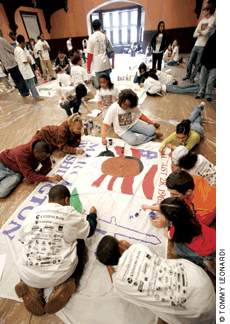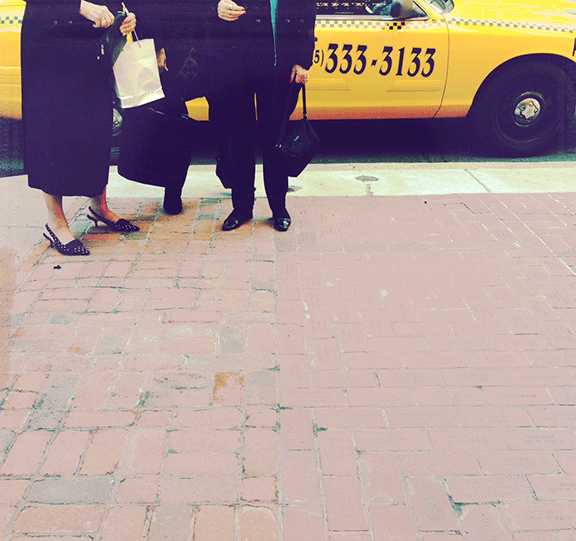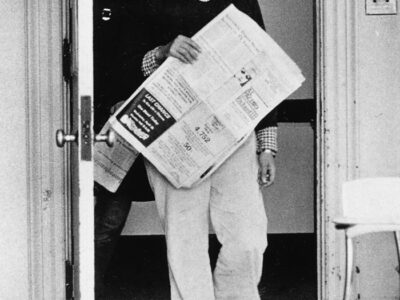
“The definition of journalism is what people in power don’t want you to know,” news correspondent Farai Chideya was saying. “But sometimes the audience doesn’t want to hear that. So if you’re a journalist who’s telling people what they don’t want to hear, then you may be putting yourself out of a job.”
Chideya—host of her own radio show in San Francisco, contributor to NPR, ABC, and MTV news, and founder of PopandPolitics.com, an online news journal for younger Americans—was one of three journalists invited by the Center for Africana Studies to participate in a panel discussion of the media’s role in social justice. The others were NBC News correspondent Ron Allen C’79 G’01 and Charlayne Hunter-Gault, who made history as the first African American woman to graduate from the University of Georgia and who recently left her post as CNN’s Johannesburg’s bureau chief to pursue independent projects while working as a foreign correspondent for NPR.
The panel’s moderator Dr. Tukufu Zuberi, the Lasry Family Professor of Race Relations and director of the Center for Africana Studies, recalled that Dr. Martin Luther King Jr. often spoke of social justice in terms of freedom, non-violence, and the ability to participate fully within society. He then asked the panel members to comment on the media’s involvement in advancing King’s message.
“I don’t think that journalists are arbiters of social justice,” said Hunter-Gault. “But if we do our jobs properly, we give people information that helps them to act.” Chideya agreed: “To me, social justice means looking at whether or not systems serve the greater good,” she said. “Part of what it means to be a reporter is to look at systems—whether they’re business systems, government systems, education systems—and try to make sense of them.”
Allen remarked on the issue from a larger perspective: “Twenty years ago, journalism was more about doing things in the common interest. Now it’s about ratings and making money. Who’s our audience? Who are we producing this for? In the case of nightly news, the audience is 60 to 65 years old and retired. Morning shows are more of a variety show after the first fifteen minutes or so, and are huge profit centers” for the television networks.
When Zuberi asked for the panelists’ thoughts on bias in the media, Hunter-Gault pointed out the inaction of the general public. “They will complain to me if they see me at a reception, but they won’t take the trouble to write to the head of the network and say, ‘I want more news about Africa,’ or ‘I want more balanced coverage of the Iraq war.’”
Allen speculated that media bias may be caused by tight-lipped Washington officials: “There are consequences that journalists in Washington face if they do stories adversarial to the government—getting frozen out, phone doesn’t ring. This administration has been notorious about doing that.”
Another question Zuberi posed was about how Africa is covered in the news. “Basically, what sells is what I call the four Ds of the African apocalypse,” said Hunter-Gault. “Death, disease, disaster, and despair. If it’s not one of those four things, it is very hard to get it on television. And so people don’t know that there’s a vein of hope flowing in South Africa. The New York Times talked about the crisis in Niger and said the world is not responding. Why isn’t America responding to this kind of tragedy? Because that’s all Americans ever hear about, so they feel that it’s money down a rat hole. If they only knew that there were some positive things going on, it would change the psychological response to tragedy.”
Allen proposed that the source of the problem with African coverage lay behind the scenes. “The big issue is the need for more diversity in America’s newsrooms,” he said. “Ultimately, what gets on television is what people in these rooms think is important. Most of the meetings I go to, I’m the only person of color there.”
Chideya spoke about her family in Zimbabwe and how they watch the news in the hope of improving their country’s political system. “People there are smart,” she said. “They realize that their needs as citizens may not be taken care of by their government. They also know that they have an obligation to try to understand the system so that one day, when there’s an opportunity for change, they can make that change happen.”
—Chelsea Tanimura C’06




